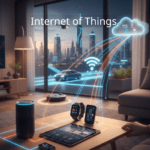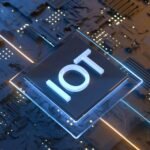Table of Contents
The healthcare industry is on the cusp of a revolution, and it’s all thanks to the transformative power of the Internet of Things. As the world becomes increasingly connected, the boundaries between healthcare providers, patients, and technology are blurring, giving rise to a new era of care that is more personalized, efficient, and effective. From remote monitoring systems that enable real-time tracking of patients’ vital signs to smart sensors that detect falls and alert caregivers, the Internet of Things is revolutionizing the way healthcare is delivered and received. With its vast potential to improve patient outcomes, reduce costs, and enhance the overall quality of care, the IoT is poised to transform modern healthcare in ways that were previously unimaginable. In this article, we’ll delve into the 20 positive impacts of IoT on modern healthcare and explore the exciting possibilities that this technology holds for the future of healthcare.
Improved Patient Monitoring and Care
The Internet of Things (IoT) has revolutionized the way healthcare providers monitor and care for their patients. With the ability to connect a vast array of devices and sensors, healthcare professionals can now keep a close eye on their patient’s vital signs, medical history, and treatment plans in real-time. This technology has led to a significant improvement in patient care, as doctors and nurses can respond quickly to any changes in a patient’s condition, reducing the risk of complications and improving health outcomes. IoT-enabled devices, such as wearable sensors and mobile apps, allow patients to take a more active role in their care, tracking their health metrics and receiving personalized guidance and reminders.
Furthermore, IoT-enabled remote monitoring systems enable patients to receive care from the comfort of their own homes, reducing the need for hospitalizations and decreasing healthcare costs. With IoT, healthcare providers can deliver more personalized, efficient, and effective care, leading to better patient outcomes and improved quality of life.
Enhanced Patient Engagement and Empowerment
The Internet of Things (IoT) has revolutionized the way patients interact with healthcare providers, empowering them to take a more active role in their care. With the proliferation of wearable devices, mobile apps, and telemedicine platforms, patients can now monitor their health metrics in real time, track their treatment plans, and communicate with healthcare professionals remotely. This enhanced patient engagement has led to improved health outcomes, increased medication adherence, and better management of chronic conditions. Furthermore, IoT-enabled devices have enabled patients to take ownership of their health, making informed decisions about their care and lifestyle choices. This shift in patient empowerment has not only improved the quality of life for individuals but also reduced the burden on healthcare systems, leading to a more efficient and effective delivery of care.
Increased Efficiency and Reduced Costs
The Internet of Things (IoT) has revolutionized the healthcare industry in numerous ways, and one of the most significant benefits is the increased efficiency and reduced costs it brings. With IoT-enabled devices, healthcare professionals can streamline their workflows, automate mundane tasks, and focus on providing high-quality patient care. For instance, remote patient monitoring systems allow doctors to track patients’ vital signs and health metrics in real time, reducing the need for frequent hospital visits and enabling timely interventions.
Additionally, IoT-powered supply chain management systems help hospitals optimize their inventory and reduce waste, resulting in significant cost savings. Furthermore, IoT-enabled medical devices, such as smart insulin pumps and portable defibrillators, can transmit data to healthcare providers, reducing the need for manual data entry and minimizing errors. By increasing efficiency and reducing costs, IoT is transforming the healthcare industry, enabling providers to deliver better care at a lower price.
Better Disease Management and Prevention
One of the most significant advantages of IoT in modern healthcare is its potential to revolutionize disease management and prevention. With the help of IoT-enabled devices, patients can monitor their health metrics in real-time, allowing for early detection of potential health issues. This technology enables healthcare professionals to intervene early, preventing the progression of diseases and improving patient outcomes.
IoT sensors can also track vital signs, such as blood glucose levels, blood pressure, and heart rate, enabling timely interventions and reducing the risk of complications. Furthermore, IoT-enabled wearables can detect early warning signs of chronic diseases, such as diabetes, cardiovascular disease, and asthma, allowing for proactive measures to be taken to prevent or manage these conditions. By leveraging IoT technology, healthcare providers can shift their focus from reactive to proactive care, reducing the burden of disease on individuals and the healthcare system as a whole.
New Opportunities for Remote and Telemedicine
The Internet of Things (IoT) has opened up a world of possibilities for remote and telemedicine, revolutionizing the way healthcare services are delivered and received. With IoT-enabled devices, patients can now be monitored and treated from the comfort of their own homes, reducing the need for hospital visits and wait times. Remote monitoring systems, such as wearable devices and mobile apps, can track vital signs, detect anomalies, and alert healthcare professionals to potential issues before they become serious.
This technology enables early intervention and prevention, reducing the risk of complications and improving patient outcomes. Furthermore, telemedicine platforms can connect patients with specialists and healthcare professionals from anywhere in the world, breaking down geographical barriers and increasing access to quality care. IoT has also enabled the development of virtual consultations, allowing patients to receive personalized care and advice remotely, reducing the need for in-person visits, and improving the overall efficiency of healthcare services. With IoT, the possibilities for remote and telemedicine are endless, and the benefits to patients, healthcare providers, and the healthcare system as a whole are undeniable.
The IOT Future of Healthcare: Trends and Predictions
As the Internet of Things (IoT) continues to revolutionize modern healthcare, the future of medical care looks brighter than ever. With the increasing adoption of connected devices, wearables, and sensors, healthcare providers are poised to unlock unprecedented levels of efficiency, accuracy, and patient-centred care. In the years to come, we can expect to see even more innovative applications of IoT in healthcare, including the widespread adoption of artificial intelligence, blockchain, and 5G networks. Predictions suggest that IoT will enable healthcare providers to move beyond reactive care, instead focusing on preventive and predictive medicine. With the ability to track patient health in real-time, healthcare professionals will be able to identify potential health risks before they become serious, reducing hospitalizations and improving patient outcomes. Furthermore, the rise of telemedicine and remote patient monitoring will continue to blur the lines between traditional healthcare settings and the comfort of patients’ own homes. As IoT continues to shape the future of healthcare, one thing is certain: the possibilities are endless, and the impact will be transformative.
Conclusion
The Internet of Things (IoT) is fundamentally transforming the healthcare landscape, bringing about a host of positive impacts that are enhancing patient care, improving efficiency, and reducing costs. From enabling real-time patient monitoring and empowering patients to take charge of their health to streamline healthcare operations and opening up new possibilities for remote and telemedicine services, IoT is driving a revolution in modern healthcare. As we look to the future, the integration of IoT with emerging technologies like artificial intelligence, blockchain, and advanced communication networks promises even greater advancements. This technological convergence will not only facilitate preventive and predictive medicine but also make high-quality healthcare accessible to a broader population. The journey of IoT in healthcare is just beginning, and its potential to transform the industry and improve lives is truly boundless.










